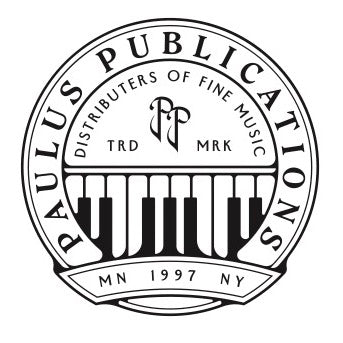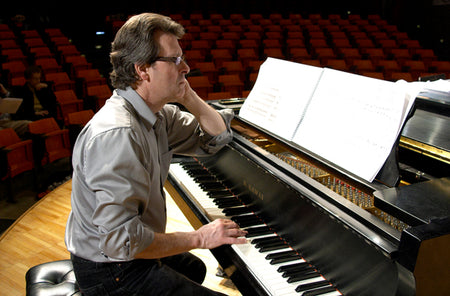This is the third installment of a monthly series of stories on the work of American composer Stephen Paulus. The previous stories were on Pilgrims' Hymn and The Road Home.
I grew up watching and listening to my Dad compose music on the grand piano in our family house. Over the years, memories of what pieces he was working on start to blend together, but a few stand out. One of those is To Be Certain of the Dawn. My Dad approached writing this piece with a particularly deep level of compassion and empathy that made an impression on me even as a young teenager at the time. The connection between Stephen, his long-time collaborator and librettist Michael Dennis Browne, and Father Michael O'Connell from the Basilica of St. Mary who commissioned this work was particularly strong throughout the entire process. They all seemed to profoundly understand the importance of this piece and its potential impact. Given the tremendous energy that went towards bringing this piece to life it has been wonderful to see it receive over 20 additional performances across the world since its premiere by The Minnesota Orchestra and conductor Osmo Vänskä in 2005.
Stephen did not get a chance to write a personal reflection on this piece, but below is a video interview with Stephen and Michael taken in 2011 as well as note from the librettist, and a video of a recent performance by the Corvallis-OSU Symphony and OSU Chamber Choir. For those on the west coast, there will be two performances this weekend from San Diego State University Symphony Orchestra on Saturday April 25th (tickets here) and the Festival Chorale Oregon on Sunday, April 26th (tickets here).
-Andrew Paulus
Stephen Paulus and Michael Dennis Browne discuss To Be Certain of the Dawn
A note from librettist Michael Dennis Browne
This oratorio was commissioned by Fr. Michael O’Connell, rector of the Basilica of Saint Mary, and intended as a gift from the Christian community to the Jewish community. The first performance was at the Basilica in November 2005, a year which marked the sixtieth anniversary of the liberation of the death camps and the fortieth anniversary of the Vatican document Nostra Aetate (In Our Time), which had much to do with the renewal of dialogue between Jews and Christians. The twentieth and twenty-first performances of the work are being held in San Diego and Salem, Oregon, in the month of April.
In Part One (Renewal), we hear from the chorus Christian grief at their failure to support Jews in the terrible ordeal of the Shoah and for many centuries of “the teaching of contempt.” We hear their desire for teshuvah—repentance, atonement, a return to the spiritual roots of their faith in Judaism. We also hear four blessings sung by the children: this is an example of the impulse to praise God, daily, frequently, even while storm clouds are gathering. We also hear from the cantor the Sh’ma and phrases from the Kaddish, as well as the introduction of the recurring theme “You should love your neighbor as yourself.”
In Part Two (Remembrance), the soloists sing dramatizations of four photographs taken from Roman Vishniac’s book Children of a Vanished World—glimpses of what Geoffrey Hartman calls “a vanished life in its vigor.” The chorus continues with more expressions of Christian remorse together with a wish to “grow and be known by our love.” We also hear quotation from the Nuremberg laws of the 1903s with their inhuman constrictions upon Jewish life. The section concludes with Hymn to the Eternal Flame, which is based on the children’s memorial of multiple reflected flames at Yad Vashem in Jerusalem.
In Part Three (Visions), several themes are woven: the desire for Jews and Christians to walk together in solidarity of interfaith in “the country of justice,” however scarred the world; divine promises as revealed in the Hebrew Scriptures; quotations taken from interviews with three Minnesota-based survivors and the daughter of one survivor. At the conclusion, both choruses, together with the cantor, sing “You should love your neighbor as yourself” in Hebrew, and we hear the sound of the shofar, with which the work began.
-Michael Dennis Browne
A performance by Corvallis-OSU Symphony and the OSU Chamber Choir
For those who may be interested in performing To Be Certain of the Dawn there is also a set of performance guidelines to ensure a successful performance that you can download here. It describes everything from context for the piece to a cue sheet for the photos that are projected during the piece.
If you are interested in purchasing a recording you can find a CD of the premiere on Amazon here.
If you are interested in learning more about To Be Certain of the Dawn or purchasing study scores, piano/vocal scores, a children's chorus score or the excerpted Hymn to The Eternal Flame you can buy digital scores from our website or purchase paper scores from our partner distributor Subito Music here. If you have any questions about performing this piece please feel free to email ap@stephenpaulus.com.


